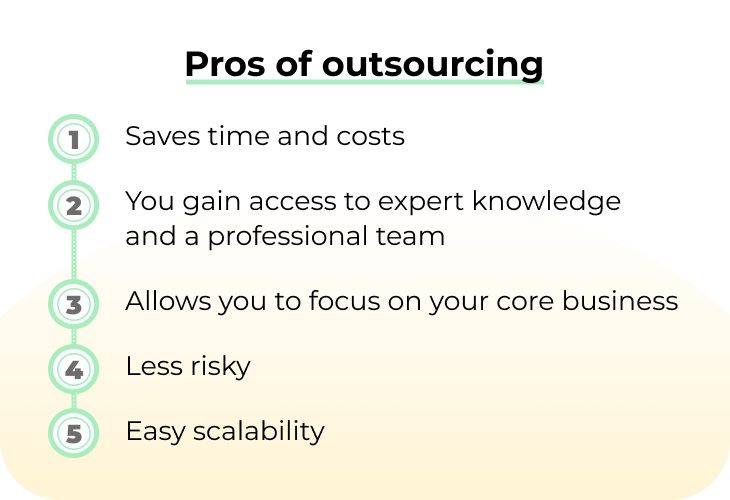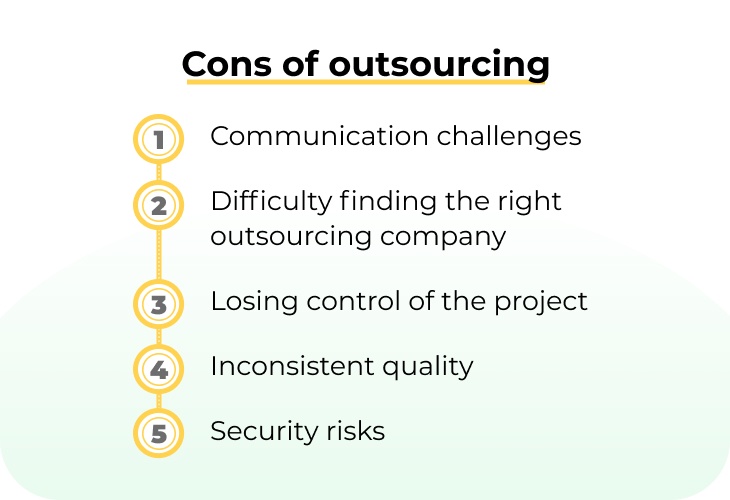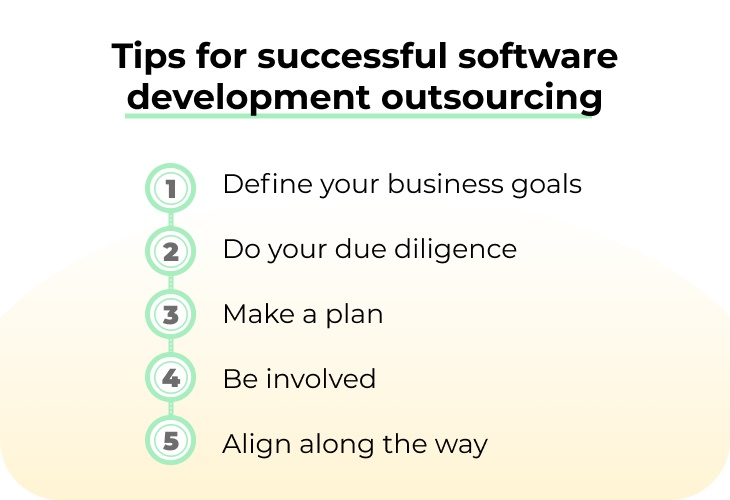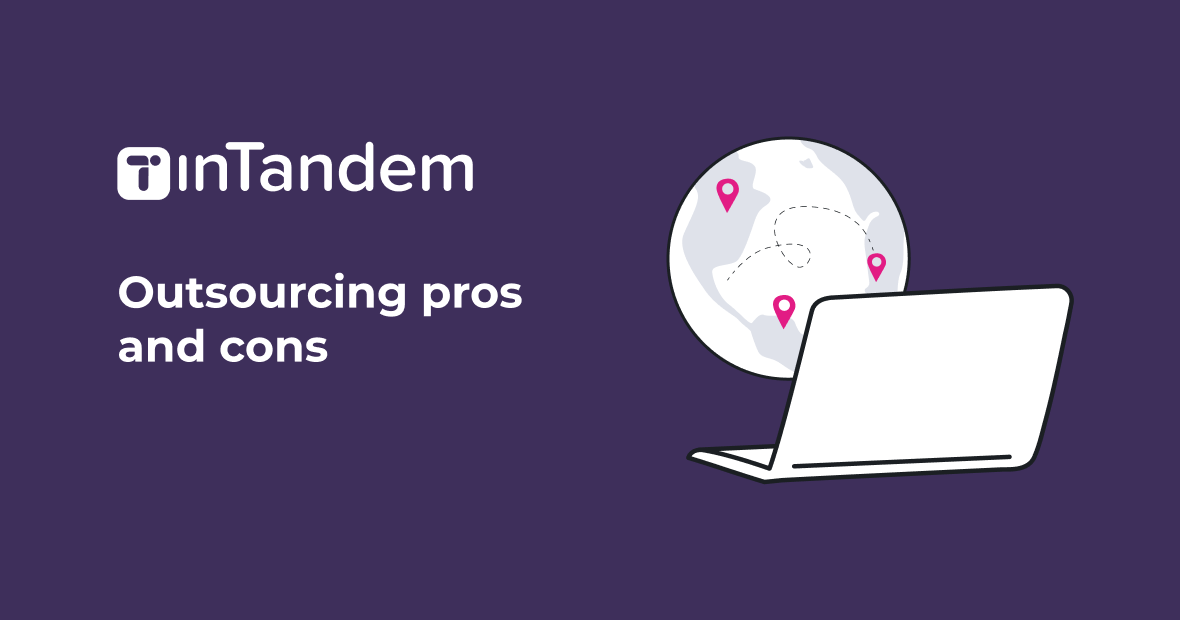There may come a time in your company’s growth journey when more of the same isn’t cutting it anymore. Maybe the market is tight, and you need a new way to differentiate yourself from your competitors, like expanding your offering with complementary tools or services for your customers. In most cases, that means developing new software or technology.
Then comes the ultimate dilemma. Should you develop the software in-house or work with an outsourcing company? The answer isn’t as straightforward as you think. This article will look at outsourcing software development pros and cons and provide some insight on how to outsource software development if you choose to take that path.
The pros of outsourcing software development

There are many reasons why outsourcing software development makes sense. These are some of the key benefits of outsourcing software development.
Saves time and costs
When an opportunity arises, you want to capitalize on it before someone else does. Outsourcing to a software company with the expertise to hit the ground running can help you get your project to market faster and stay ahead of the competition. In addition, an outsourced team can often provide training in sales and marketing, cutting the costs of having to hire your own team and develop your own product and marketing materials.
You gain access to expert knowledge and a professional team
The project you’re looking to implement may be a first for your company, but software development outsourcing allows you to benefit from the experience the outsourcing company has gained with similar projects they’ve done for other customers. In addition, outsourcing companies often include people with different types of expertise who are familiar with the most advanced technologies, something that isn’t always true for in-house teams.
Allows you to focus on your core business
If you’re not a software development company, any time and energy you invest in software development is time that you’re not spending on your core business activity. Software development outsourcing minimizes the distraction and allows you to stay focused on your core activities.
Less risky
Some initiatives take off, while others don’t deliver the expected results. When that happens, it’s important to cut your losses instead of continuing to pour resources into a project that isn’t going anywhere. If you’ve hired an in-house team, that isn’t always easy to do. Labor laws or the employees’ contracts may require you to give notice before letting employees go and pay them significant compensation.
Outsourcing reduces that risk. You can include exit clauses in the contract, and end things quickly if the project isn’t delivering as planned.
Easy scalability
On the other hand, if the project takes off you want to capitalize on the success which means you need the capacity to scale fast. Hiring additional staff in-house can take time, especially in an enterprise with strict hiring protocols and limitations in place. Outsourcing lets you circumvent those limitations and make the most of the business opportunity.
The cons of outsourcing software development

The advantages are clear, but that doesn’t mean that outsourcing software development projects makes sense in every situation. Before discussing how to choose the best option for your company, let’s look at some of the disadvantages of outsourcing.
Communication challenges
Every organization has its own culture, lingo, workflows, and focus that outsiders may not understand. Even with detailed specs, communicating your vision and expectations to a software development outsourcing company can be difficult.
Difficulty finding the right outsourcing company
Not all software development outsourcing companies were created equal, and there is enormous variation in the quality and expertise they can provide. With so many options, it isn’t always easy to find the right company for your specific needs. Even if you take the time to check references and read reviews, what worked for another company doesn’t always work for yours.
Losing control of the project
Once you hand the project over to an outsourcing company, it’s out of your hands. Although you can and should stay involved and have regular alignment meetings, someone else is ultimately calling the shots.
Inconsistent quality
Most software development outsourcing companies have a specific area of expertise, something they truly excel at. However, they often claim expertise in additional areas to bring in new business with an “all in one” offering, when, in reality, they’re also outsourcing some aspects of the project. In other cases, they may be using freelancers to handle overflow. If they don’t vet their partners carefully, some things may be top quality while others are sub-par.
Security risks
When you outsource a project, you’re giving someone else access to the inner workings of your business. While it’s true that data leaks can also be a risk with in-house employees, when you outsource, you can’t vet each and every employee like you do when you hire. Plus, you have limited oversight over how the outsourcing company employees work, their security protocols, and what precautions they take to protect your data.
When should you consider outsourcing software development?
Like with many other things, there are plusses and minuses to outsourcing software development. Even after carefully weighing pros and cons, how can you determine when it’s the right choice? These are some of the scenarios when outsourcing can be the best option.
- When you don’t have the expertise in-house
At the most basic level, outsourcing makes sense if your company lacks the internal knowledge to implement the desired project. Rather than letting the opportunity slip away, outsourcing software development is a way to make it happen.
- When your budget is limited
Full-time developers are expensive and the costs of hiring developers in-house can reduce or even eliminate a project’s ROI. Since outsourcing company developers split their time between projects, they are often more affordable.
- When software development isn’t the core of your business
As a business leader, you need to stay focused. If software development isn’t at the core of what you do, it can quickly become a distraction.
- When you need to expand fast
If you’re looking to rapidly expand your business offering due to a unique window of opportunity you may need a lot of software development manpower ASAP. However, once the project is up and running, much of that manpower will no longer be needed. If you expect that scenario, working with an outsourcing company is a smart choice.
Tips for successful software development outsourcing

Once you’ve decided that software development outsourcing is the right choice, it’s important to understand how to outsource in the best way possible. These are some things you can do to ensure success.
Define your business goals
Outsourcing companies often think of projects in terms of what is possible from a technology standpoint, and not from the perspective of what is going to deliver true value and functionality to your company. Make sure to define your business goals clearly to the outsourcing company so they can allocate resources where they’ll have the biggest impact.
Do your due diligence
How much does it cost to outsource software development? The range in pricing is enormous, as is the variety in what is and isn’t included in the service. That’s why it isn’t a good idea to simply go with the first company that comes up in a Google search. Read reviews on neutral platforms, ask to see similar projects the outsourcing company has successfully completed, and request references you can talk to. Get quotes from several companies and carefully review what’s included in each quote to make an accurate comparison.
Make a plan
Planning is a key part of outsourcing software development, so don’t just sign the contract and hope for the best. Sit down with the outsourcing company and map out how the project is going to be implemented. Detail the various stages, who needs to be involved and sign off on each step, and what the deliverables are. Include contingency plans, and methods for resolving problems if and when they occur.
Be involved
While outsourcing does minimize what you have to do, it doesn’t mean you can hand the project off and forget about it, even with the best planning. Give regular input, ask questions, and request changes whenever you think they’re needed.
Align along the way
Don’t ignore the project and wait until the finished product is ready. There are often miscommunications and misunderstandings when you outsource projects, and the sooner you catch them, the less damage they will cause and the easier it will be to fix the problem.
Protecting your IP when outsourcing
When you outsource your tech development, you want to make sure you’re protecting your intellectual property (IP). Here are the key agreements to sign to ensure your IP is safeguarded:
- NDAs: Make sure all parties involved sign non-disclosure agreements (NDAs) which prevent anyone from disclosing any proprietary information.
- IPAAs: This is an agreement that ensures any IP that is developed during the project gets assigned to the hiring company and not to the outsourcing provider.
- MSAs: The Master Service Agreement defines the overall terms and conditions for the work, including IP rights, confidentiality, and security.
- Work-for-hire agreement: This agreement specifies that all the work produced by the outsourced company belongs to the hiring company from the beginning of the project.
Alternative ways to make your software dreams come true
Hiring an in-house team or outsourcing the entire project aren’t the only options for software development projects. Many businesses look to offshoring (hiring overseas) or nearshoring (hiring in a nearby country or region) instead, hoping to hire the experts they need and maintain full control of the project at a lower cost than hiring locally. Yet hiring overseas comes with its own set of challenges. These include:
- Identifying effective recruitment platforms and strategies
- Language and communication problems associated with working with another culture
- Compliance with labor and taxation laws in the employee’s country
- Coordinating workflows across time zones and accommodating different national vacation schedules
inTandem, a SaaS partnership solution by vcita, gives you another way to outsource software development and offer your SMB clients added value without the hassle of developing new in-house capabilities, managing overseas staff, or working with an outsourcing company. We’ve spent over a decade learning what small business owners really need and that experience is built into inTandem’s tried-and-tested small business management software. Best of all, inTandem is a white-label solution, with options for co-branding in every element of the platform. Learn more about inTandem here.
The bottom line on outsourcing software development
To sum it all up—you’ve got options for your software development needs. Each route has unique advantages and disadvantages, and it’s important to weigh them carefully before choosing the best path for your business.
Let us know if you have any questions, we’d be happy to help you think it through.


























